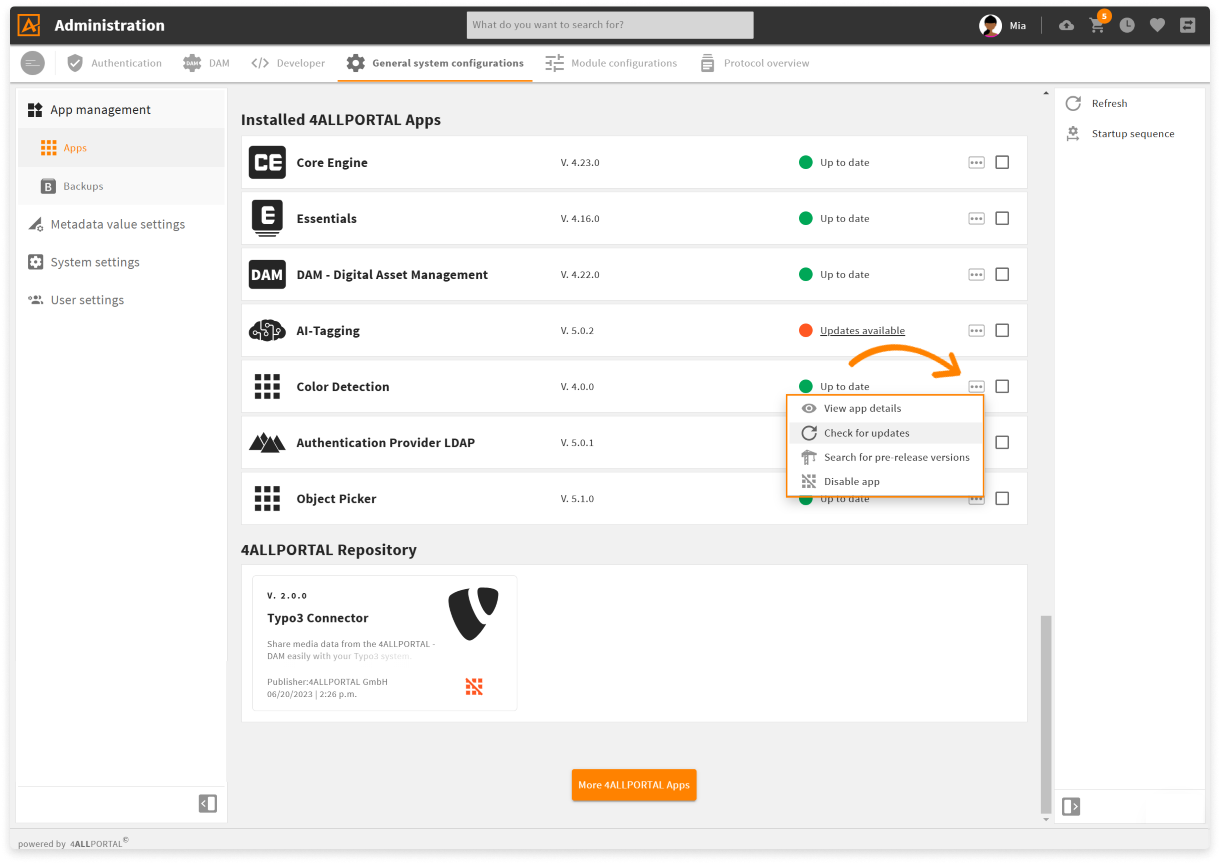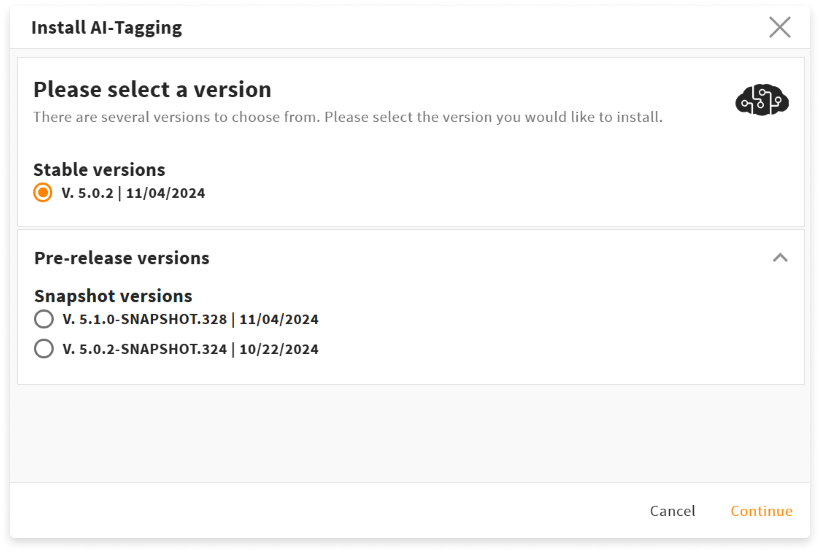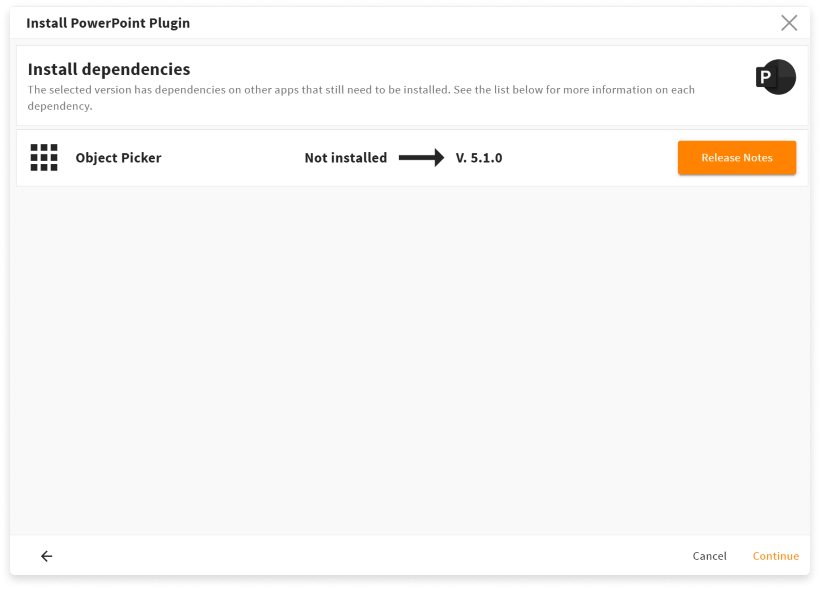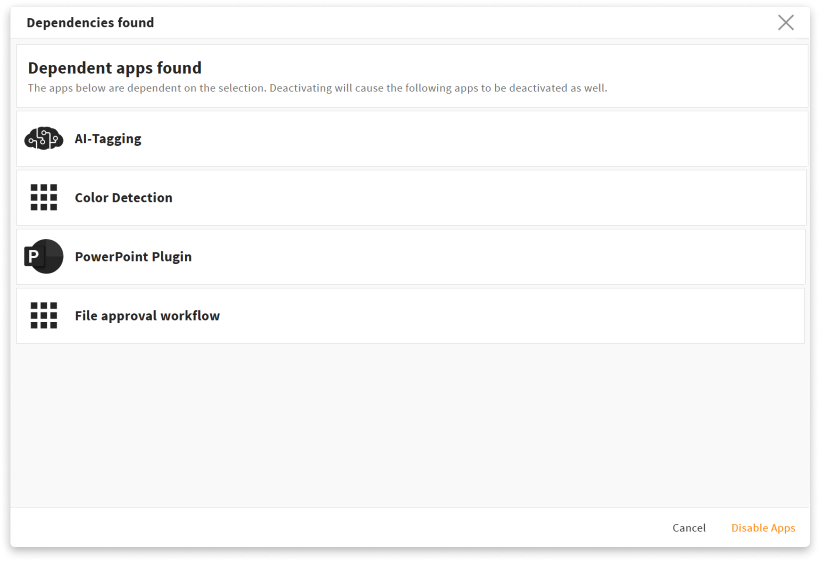# Installing and Updating 4Apps
To install and manage 4ALLPORTAL 4Apps, go to admin snap-in group General system configurations/App management.
- Snap-in Apps gives you an overview of installed and downloaded 4Apps, and the option to upgrade and download new 4Apps.
- Snap-in Backups lets you create backups of your custom folder.
We recommend installing only stable versions of a 4App for a live system usage and to always upgrade to the latest version available.
Docker: Core Engine Updates
For systems running in a Docker container, it is not possible to update the Core Engine using the App Management. The new version must be updated directly in the Docker image.
Note that from Core Engine version 4.0, we only support installations with Docker.
Cloud Systems: Automatic Updates
Please note that systems running in a cloud are automatically updated according to their release channel. Updating 4Apps is therefore not done manually in the App management admin snap-in.
Further information: Release Channels
# Apps
Admin snap-in Apps shows all currently installed 4Apps with their version and upgrade status as well as all currently deactivated 4Apps stored in your local repository. Click the "More" button of a 4App to get the following options:

- View app details to get a description, all downloaded versions and publisher information
- Check for updates to refresh the update status for stable releases
- Search for pre-release versions to get update information for snapshot releases
- Disable app to deactivate a 4App and its functions and modules (it will be moved to section "4ALLPORTAL Repository" where it can be activated again)
Via our toolbox you can also refresh the update status for all 4Apps (stable versions) and configure your 4App's startup sequence (more details).
# artifactID
Some of the following functions require the technical name of a 4App (called artifactID). Its scheme is 4allportal-{name}. For example, the artifactID of 4App Core Engine is 4allportal-core, the artifactID of 4App Videocut is 4allportal-file-videocut.
The artifactID can be found in a 4App's 4app.json, or is given to you by our support, if required.
# Install a New 4App
# Step 1: Marketplace
Click button More 4ALLPORTAL Apps to search for available 4Apps in our marketplace (opens new window). Check a 4App's Release Notes before clicking "Install" and contact our sales team if a 4App requires licensing.
# Step 2: Install
When you install a 4App, the system downloads the latest stable version from our repository server and stores it in folder 4allportal/data/apps_repository of your filesystem. You will find the installed 4App in snap-in Apps, section "4ALLPORTAL Repository". You will be redirected to snap-in Apps or the login screen automatically.
Further information
- Repository server: The external (4ALLPORTAL) server from which you download 4Apps
apps_repositoryfolder: Your local repository folder with all ever downloaded 4Apps and 4App versions (active and deactivated 4Apps)appsfolder: Your local folder for active 4Apps. If a 4App is not placed here, it is not active in your system.
# Step 3: Activate
To activate a 4App from the repository, select it from section "4ALLPORTAL Repository" and choose action "Activate app" from your toolbox. A pop-up window opens and shows the downloaded version from your local repository folder. Select it and continue with reading the Release Notes. If you are sure, click "Continue" to install. The 4App is now copied from folder 4allportal/data/apps_repository to folder 4allportal/data/apps in your filesystem. Accordingly, you can now find the 4App in section "Installed 4ALLPORTAL Apps".
Activation Pop-up Window
The pop-up window shows all contents from your local repository folder. If you download a 4App for the first time, the folder only contains the latest stable version. If you have also downloaded other stable or pre-release versions before, all these show when activating a 4App from the repository:

Please note: The activation pop-up does not automatically search for and suggest updates. It shows only already downloaded versions.
# Step 4: Reload
Restart your system to use a 4App's features and modules.
# Upgrade an Existing 4App
We continuously improve and upgrade our 4Apps. The upgrade status always informs you if a new stable version of a 4App is available to download from the repository server (shows the last patch version available of each minor and major version).
With each visit of snap-in Apps or when clicking the "Refresh" action from the toolbox or the "More" menu, the system sends a request for all installed 4Apps to our repository server and updates the status if a new version is available.
If a new version is available, click "Update available". A pop-up windows opens, and you can choose the latest available stable version and install it. The 4App upgrades automatically after a restart.
Please note: Make sure to read and confirm the Release Notes with their admin instructions before upgrading.
# Core Engine Upgrades with Docker
If your 4ALLPORTAL is running in a Docker container, you need to update the Core Engine by setting the tag of the 4ALLPORTAL Docker image to the appropriate version (e.g. 4.23.0). Restarting the stack will load the image with the desired Core Engine version and start the 4ALLPORTAL.
# Pre-release Versions
If you get our support team's instruction to download a pre-release version, click action "Search for pre-release versions" in the "More" menu next to a 4App.
Click "Update available" to open the upgrade pop-up. You can now select the latest snapshot version available of each minor and major release.
Please note: An installed snapshot version of a 4App will not be marked with "Update available" automatically if a newer snapshot version is available. Pre-release versions must always be searched for and upgraded manually.
A snapshot's status would only change with the next new stable release available (e.g. it would inform you if you could update from version 4.24.1.SNAPSHOT.123 to stable version 4.24.1 or higher).
Attention!
Pre-release versions are still developer's work in progress and may contain malfunctions or disturb your working system. We recommend upgrading or installing only stable versions for a live system usage. Always get in touch with our support team before you install a pre-release version.
# Deactivating a 4App
To deactivate a 4App, select it from section "Installed 4ALLPORTAL Apps" and choose action "Deactivate app" from the toolbox or the "More" menu of a 4App. By doing so, the 4App will be deleted from folder 4allportal/data/apps in your filesystem. Accordingly, you now find the 4App in section "4ALLPORTAL Repository".
Please note: Our 4App CoreEngine cannot be deactivated.
Deactivate a Manually Installed 4App
In some cases you or our support team may need to place 4app-packages directly into your filesystem's app folder. In that case, the system will not move the 4App to your repository folder if you deactivate it. Instead, it will be deleted when deactivated.
If you want to move a manually placed 4app-package into the repository folder, you must do this manually, too. Make sure to put the package into a folder structure like this: artifact-ID/exact-version/, example: 4allportal-example-app/1.2.5-SNAPSHOT.56.
# Dependencies
Most 4Apps have dependencies and can only be installed if one or more other 4Apps are also installed in a minimum version on your system. For example, 4App Essentials 4.13 requires 4App Core Engine 4.18 or higher. You can find all dependencies of a 4App in its 4app.json (more information).
If you activate or update a 4App, the App management automatically checks for dependencies and installs the additionally required 4Apps. You will be informed via a pop-up window about a required 4App, the required version and get to read the Release Notes before installing it:

If you deactivate a 4App which is required for other 4Apps, the system checks and informs you:

# Dependency Information
Dependencies are defined in a 4App's 4app.json, section dependencies. Here you can find all required 4Apps with their artifactID and minimum artifactVersion.
Minimum means, all higher minor and patch versions until the next major version are also included. If a 4App requires Core Engine 3.5.2, it is also compatible with all higher minor and patch versions (3.5.3, 3.7.0, ...) until next major 4.0.0. All major versions must be given its own entry.
Example:
{
"artifactId": "4allportal-example-app",
"artifactVersion": "2.0.0",
"dependencies": [
{
"artifactId": "4allportal-core",
"artifactVersion": "3.10.0"
},
{
"artifactId": "4allportal-core",
"artifactVersion": "4.0.1"
},
{
"artifactId": "4allportal-some-other-app",
"artifactVersion": "2.1.0"
},
],
Further information
- 4app.json details (opens new window)
- Our versioning and the version dependencies follow the Semver rules. For more information, take a look at the Semver documentation here (external link) (opens new window).
# Dependency Troubleshooting
If the App Management shows a dependency error for a 4App, try deactivating and activating it. If there are dependent 4Apps, the dependency pop-up will open. You can complete the 4App activation and all dependent 4Apps will also be installed or upgraded.
# Direct Version Download
If you get our support team's instruction to install a specific version of a 4App (i.e. not the latest stable), you need to download that 4App version manually:
- If a 4App is already installed and active, deactivate it. It needs to be in section "4ALLPORTAL Repository".
- Hold
Ctrl(Windows)/Cmd(macOS) and click "More 4ALLPORTAL Apps". - A manual version entry pop-up opens. Enter a 4App's
artifactIDand the exact version number to download a specific version from the repository server (details). - This version is now available in your local repository folder.
- Select the 4App from "4ALLPORTAL Repository" and click "Activate app" to open the update pop-up.
- Make sure to select the correct version, if there is already a number of versions in your repository.
# Startup Sequence
The startup sequence displays the order in which the installed 4Apps load at system startup. With the initiation of the Core Engine, all files of all active 4Apps are copied into folder _runtime.
Effect: A 4App listed below another 4App in the startup sequence overwrites files with the same filename in folder _runtime or extends them. The last 4App in the sequence overwrites at last. After all 4Apps, the contents from the custom folder will overwrite.
Dependencies: You cannot change the sequence if 4Apps have dependencies. E.g. the Core Engine is always loaded first and cannot be moved further down.
As the order has a huge effect on your system, we recommend not changing it without checking back with our support team.
# Backups
In snap-in Backup you can create a backup of your custom folder, e.g. before changing some configuration or removing a 4App. All backups (including those created during system synchronization) are listed here. You can restore a backup via the toolbox. This will overwrite the current settings from your custom folder.
Please note: Role configurations or 4Apps are not part of a backup!
